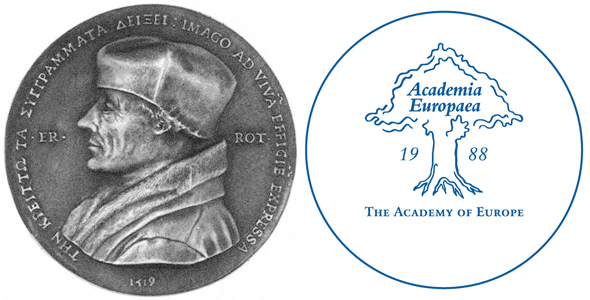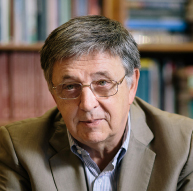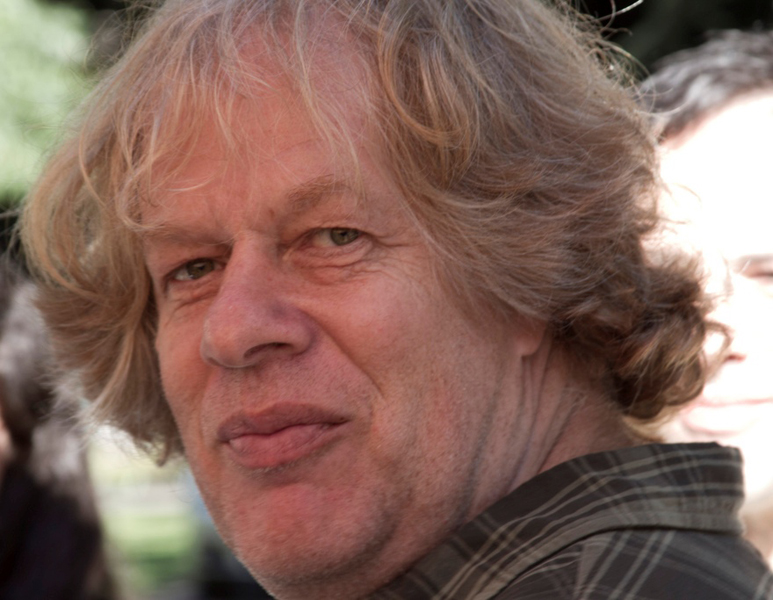Academia Europaea
The Academy of Europe#
The Academia Europaea are pleased to award an Erasmus Medal to the internationally renowned Mathematician
Professor László Lovász MAE#
The Erasmus Medal of the Academia Europaea, is awarded to a European scholar who has maintained over a sustained period of time an outstanding level of international scholarship as recognised by peers. It is perhaps the highest recognition for purely scholarly achievements that the Academy can bestow on a scholar. The Medal is awarded at the Annual Conference of the Academy and on that occasion the recipient will give the Annual Erasmus Lecture.
Professor Lovász will receive the medal and will deliver the accompanying Academia Europaea - Erasmus Lecture
"THE BEAUTY OF MATHEMATICS" #
at the annual conference of the Academia Europaea, Barcelona, on October 16th 2025.
ABSTRACT: The human brain, the most complex organ of the body, cannot be simply regarded as an electrical machine or a mechanical computer. Understanding the chemistry of the brain is a prerequisite for the understanding if its basic functions - from the intercellular communications up to the higher cognitive level - together with their pathological alterations. The billions of neurons in the brain make discontinuous networks that are bound together by chemical signals: the neurotransmitters. There are over a hundred of neurotransmitters that mediate information processing in the brain, and thus, all the operations it performs. The discovery of the molecules and molecular mechanisms involved in the signal transduction elicited by neurotransmitters has thus created a “paradigmatic change” in the history of brain sciences leading to considerable progress in the understanding of drugs action in the brain, their possible side effects and among them drug addiction with its known devastating consequences at the social level, and, most of all, their potential therapeutic action.
At the early stages, a critical role was played by the concept of allostery to qualify the interaction between topographically distinct sites on regulatory proteins - ie an active site and a regulatory site - and its mediation by a conformational change of the molecule (1961). Through their cooperative organisation, allosteric proteins would behave as “molecular switches” (1965). Early on the concept was extended to brain communications and the receptors for neurotransmitters (1964,1967). Then, the first neurotransmitter receptor was identified (1970): the nicotinic acetylcholine receptor. It was soon demonstrated to be a bona fide allosteric protein carrying several binding sites for the neurotransmitter acetylcholine, an ion channel, together with multiple allosteric modulatory sites. The elucidation, today at the atomic level, of the allosteric mechanism through which drugs modulate receptor efficacy opens revolutionary new avenues in the field of drug discovery.
Moreover, the multiple regulations to which acetylcholine receptors have access – together with thousands of subsequently discovered receptors in the brain – further extends the “paradigmatic change” to neuronal brain circuits in general, to their contribution to the short and long-term synaptic changes (ie those engaged in learning and memory), up to higher cognitive functions and - last but not least – to conscious processing. The consequences in the understanding neuropsychiatric diseases and their therapeutics are immense.
Erasmus Medal Citation#
László Lovász is a towering mathematician of our age. He has been a defining force in discrete mathematics and computer science over the past 60 years. His influence has decisively contributed to the general appeal and expansion of these fields and their closer integration with more classical areas of pure and applied mathematics. He solved a long list of major open problems, each time tackling the problem with powerful new techniques of which the significance went far beyond their original target. He is arguably the most influential theory builder of discrete mathematics. In particular, he has been one of the pioneers of the interplay between computer science, discrete and continuous mathematics, a master at establishing unexpected connections between seemingly distant fields. His invariably elegant and powerful ideas have spawned new subfields in many areas.
László Lovász has changed the landscape not only in discrete mathematics and computer science, but has contributed significant new tools to many other fields, including linear programming, information theory, number theory, cryptography, functional analysis, probability theory, and statistical physics. His crowning achievements include the proof of the weak perfect graph conjecture, the proof of Kneser's conjecture, the Lovász Local Lemma, the Lovász number of graphs, the Lenstra–Lenstra–Lovász lattice reduction algorithm, the ellipsoid method in combinatorial optimization, and the theory of graph limits.
László Lovász had a rich and diverse academic career: he was Professor at Yale University, he has worked for Microsoft Research, and he was president of the International Mathematical Union and the Hungarian Academy of Sciences. He has written 12 books and 318 articles, and there is no sign of him slowing down. His distinguished honors include the Abel Prize (2021), the Kyoto Prize (2010), the Wolf Prize (1999), and he is a member of the Academia Europaea since 1991. His lasting legacy and continued inspiration for the mathematical community make him a perfect candidate for the Erasmus Medal.
Based on his distinguished scientific achievements, his contributions to European scientific culture and his commitment to Academia Europaea as one of its early members (elected in 1991), Academia Europaea is pleased and honoured to award the 2025 Academia Europaea Erasmus Medal to Professor Laszlo Lovasz.
General biography#
https://lovasz.web.elte.hu/index.html
Affiliation: HUN-REN Afréd Rényi Mathematical Research Institute , Hungary
, Hungary
Short synopsis#
László Lovász was born on March 9, 1948 in Budapest, Hungary. He is married, has 4 children. He obtained his doctoral degree in mathematics from the Eötvös Loránd University , in Budapest, Hungary in 1971. He is a member of the Hungarian Academy of Sciences
, in Budapest, Hungary in 1971. He is a member of the Hungarian Academy of Sciences , the US National Academy of Sciences
, the US National Academy of Sciences and several other Academies.
and several other Academies.
He held the Chair of Geometry at the University of Szeged (1975-1982) and the Chair of Computer Science at the Eötvös Loránd University (Budapest, 1983-1993). He was A.D. White Professor-at-Large at Cornell University
(1975-1982) and the Chair of Computer Science at the Eötvös Loránd University (Budapest, 1983-1993). He was A.D. White Professor-at-Large at Cornell University (1982-1987), Professor of Mathematics and Computer Science at Yale University
(1982-1987), Professor of Mathematics and Computer Science at Yale University (1993-1999), Senior/Principal Researcher at Microsoft Research (1999-2006), Director of the Mathematical Institute of the Eötvös Loránd University (2006-2011), and President of the Hungarian Academy of Sciences (2014-2020). Currently he is a Research Professor at the Alfréd Rényi Institute of Mathematics
(1993-1999), Senior/Principal Researcher at Microsoft Research (1999-2006), Director of the Mathematical Institute of the Eötvös Loránd University (2006-2011), and President of the Hungarian Academy of Sciences (2014-2020). Currently he is a Research Professor at the Alfréd Rényi Institute of Mathematics .
.
His awards include the George Polya Prize (1979), the Ray D.Fulkerson Prize (1982, 2012), the Wolf Prize (1999), the Gödel Prize (2001), the Kyoto Prize (2010) and the Abel Prize (2021). In 2018 he was awarded the first Barcelona-AE HYPATIA Prize. He was founding editor-in-chief of Combinatorica and editor of 10 other Journals.
His field of research is discrete mathematics, its applications to the theory theory of computing, and its interactions with classical mathematics. He wrote 5 research monographs and 4 textbooks, and over 300 research papers.
Laudator#
The medal citation will be made at the award ceremony by Professor János Pach MAE, who is Professor of Combinatorial Geometry at Rényi Institute of Mathematics (Budapest) & EPFL (Lausanne).
(Budapest) & EPFL (Lausanne).
DOCUMENTS:
Press enquiries to The Executive Secretary at AE HQ, Munich#
The Erasmus Medal is the highest Award that the Academia Europaea can bestow. It recognises an individual’s substantial life-long scholarly achievement. The prize carries no financial benefit and is open to nominations of candidates who are members and non-members. Non-members also receive the honour of immediate election to the Academy.”.
Information about the Erasmus medal and a list of past winners can be found on our website.
Press enquiries to The Executive Secretary at AE HQ, Munich#
The Erasmus Medal is the highest Award that the Academia Europaea can bestow. It recognises an individual’s substantial life-long scholarly achievement. The prize carries no financial benefit and is open to nominations of candidates who are members and non-members. Non-members also receive the honour of immediate election to the Academy.”.
Information about the Erasmus medal and a list of past winners can be found on our website.
1. Heinz Nixdorf Stiftung is - together with Stiftung Westfalen - one of the two non profit foundations, which have been established from the assets of the estate of the entrepreneur Heinz Nixdorf, who died in 1986. The foundation promotes the following purposes:
a) the (advanced) professional education, especially in the field of modern technology
b) the sciences in respect of research and teaching, especially in the field of information technology,
c) the liberal and democratic governmental system, especially the "Soziale Marktwirtschaft"
d) public health,
e) sports.
The foundation realizes its purposes primarily in cooperation with other non profit institutions.
Heinz Nixdorf Stiftung promotes among others the Heinz Nixdorf MuseumsForum in Paderborn. This is a non profit istitution combining in a unique way the classic historic dimension of a museum with the current and future-oriented topics of a forum.
Heinz Nixdorf MuseumsForum is the largest computer museum of the world.





